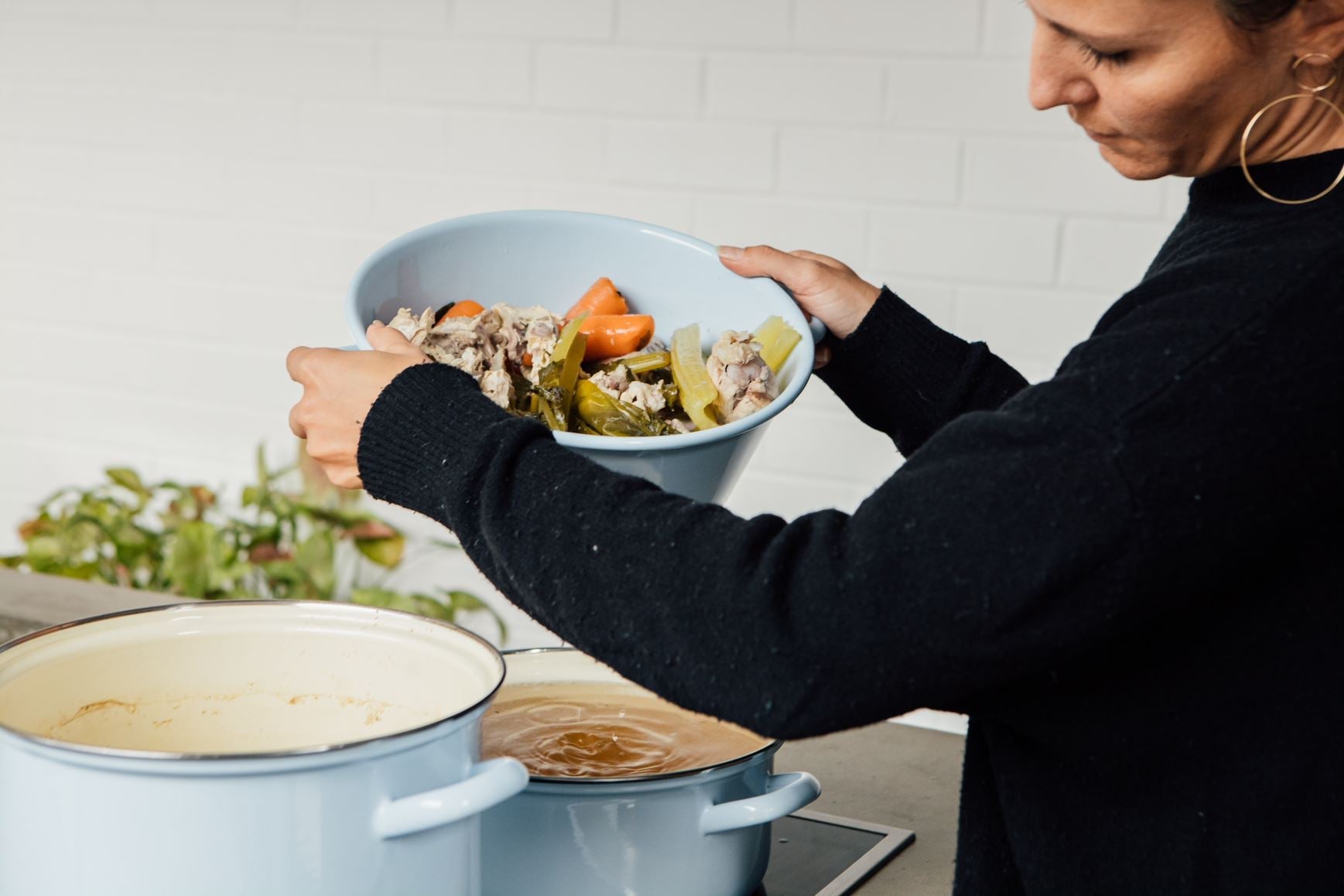The aValue of Healthy Food: Why Bone Broth Is a Fantastic Selection for Babies
Bone broth stands out as a nutrient-dense option, supplying vital vitamins and minerals that support growth and development. What are the best ways to present bone broth to your little one?
Nutritional Advantages of Bone Broth for Infants
When you present bone broth to your baby's diet plan, you're giving a nutrient-dense food that uses countless wellness advantages. Packed with vital nutrients, bone broth contains calcium, magnesium, and phosphorus, which sustain your baby's expanding bones. It's also abundant in collagen, aiding in the development of healthy skin, joints, and connective tissues.
Moreover, bone broth is an excellent source of amino acids like glycine and proline, which play a considerable duty in overall development and muscle development. These nutrients aid advertise a solid immune system, setting a strong structure for your child's health.
Furthermore, bone broth is very easy to absorb, making it a gentle choice for your child. By incorporating this wholesome food right into their meals, you're guaranteeing they obtain necessary nutrients required for their general well-being. Go in advance and make bone broth a staple in your infant's diet!
How Bone Broth Sustains Food Digestion
Bone broth is packed with essential nutrients that can actually profit your infant's food digestion. It advertises intestine health and assists with nutrient absorption, making it a fantastic enhancement to their diet regimen. By including bone broth, you're setting the stage for a much healthier digestive system.
Nutrient-Rich Make-up
Among one of the most nutrient-rich foods you can present to your infant's diet plan is bone broth, which is loaded with important minerals and amino acids that support healthy food digestion. Rich in collagen, bone broth helps strengthen your baby's gut cellular lining, making it less complicated for their body to absorb nutrients. It provides jelly, which assists in breaking down healthy proteins, promoting smoother food digestion. Additionally, the broth consists of necessary electrolytes like potassium and magnesium, ensuring your baby remains hydrated and stabilized. The amino acids, such as glycine and proline, play an important function in repairing cells and sustaining overall wellness (chicken bone broth). By incorporating bone broth into your infant's meals, you're offering them a wholesome food that supports their gastrointestinal system successfully.
Advertises Gut Health And Wellness
As you introduce bone broth right into your baby's diet plan, you'll discover it not only nourishes yet likewise promotes digestive tract health effectively. Rich in gelatin, bone broth assists relieve the digestion tract, reducing inflammation and supporting a healthy digestive tract lining. In addition, the amino acids located in bone broth, such as glycine, aid in digestion and can aid avoid common tummy difficulties.
Aids Nutrient Absorption
Introducing bone broth not only supports intestine health yet likewise plays a substantial function in helping vitamins and mineral absorption. When you offer your infant bone broth, you're giving a rich source of minerals and amino acids that enhance their digestive system processes. The jelly in bone broth aids to relieve the intestine lining, improving its capacity to absorb necessary nutrients.
Strengthening the Body Immune System With Bone Broth

By including bone broth into your child's diet plan, you're providing a natural resource of nutrition that advertises wellness. Consider making bone broth a staple in your infant's dishes, as it can play an important function in their immune health and development.
Easy Ways to Include Bone Broth Into Infant's Diet regimen
Integrating bone broth into your baby's diet regimen can be easy and fulfilling. Start by blending a little quantity of bone broth into pureed vegetables or fruits. This adds taste and nutrients without overwhelming your kid. You can also utilize bone broth as a base for Your Domain Name soups or stews that you prepare for the family, guaranteeing your baby gets a taste of tasty, well balanced meals.
One more option is to offer bone broth by itself. Cozy it up and offer it in a sippy cup or tiny dish-- it's a fantastic method to present brand-new flavors. If your infant enjoys grains, think about cooking rice or quinoa in bone broth rather than water for additional nourishment. Finally, you can freeze bone broth in ice cube trays, making it simple to add a cube to different recipes whenever you want. These approaches will certainly assist your child gain the advantages of bone broth easily!
Homemade vs. Store-Bought Bone Broth: What to Pick
Which is much better for your infant: homemade or store-bought bone broth? Homemade bone broth provides you full control over the ingredients.
On the various other hand, store-bought choices are practical and conserve you time. They typically contain chemicals and may not match the depth of taste and nutrition you obtain from homemade broth. If you choose for store-bought, search for brands that are natural and complimentary from additives.
Inevitably, if you have the moment and sources, homemade bone broth is the exceptional choice for your infant's wellness. If you're short promptly, select a quality store-bought choice as a back-up.
Age-Appropriate Bone Broth Serving Recommendations
As your baby expands, it's important to customize bone broth offering suggestions to their developing stage. For infants around 6 months, begin with a couple of spoonfuls of diluted bone broth (organic bone broth).
By the time your little one is around a year old, take into consideration offering bone broth as a standalone beverage or blending it right into soups and stews. Simply make certain to maintain the broth reduced in sodium.
Other Healthy Foods to Couple With Bone Broth for Infants
When you're seeking to enhance the nutritional value of bone broth for your baby, take into consideration combining it with nutrient-dense veggies like carrots and spinach. Entire grain alternatives, such as quinoa or brownish rice, click to find out more can additionally add structure and fiber. Furthermore, including healthy protein sources like shredded chicken or lentils will round out the dish perfectly.

Nutrient-Dense Veggies
Nutrient-dense veggies are a fantastic addition to bone broth for babies, boosting both taste and nutrition. Incorporating veggies like carrots, spinach, and sweet potatoes can boost the vitamin and mineral material of your broth. Carrots offer beta-carotene for healthy and balanced vision, while spinach is packed with iron and calcium, vital for growth. Pleasant potatoes add all-natural sweet taste and are abundant in fiber, aiding food digestion.
You can conveniently mix these vegetables right into the broth or serve them as soft, cooked items along with it. This not only introduces brand-new flavors however likewise encourages your youngster to delight in a variety of nutrients. By combining nutrient-dense vegetables with bone broth, you're laying the foundation for a healthy and balanced diet right from the beginning.
Whole Grain Options

Healthy And Balanced Healthy Protein Sources
Bone broth pairs wonderfully with different healthy protein sources, further boosting your baby's diet plan. Try including soft, cooked lentils; they're nutrient-dense and packed with healthy protein. You can also blend in shredded chicken or turkey, which are simple for your child to digest. If you're trying to find plant-based alternatives, think about mashed tofu or pureed chickpeas-- both offer excellent healthy protein without overwhelming tastes. Eggs, when presented securely, are one more wonderful selection; they're functional and packed with nutrients. Ultimately, assimilating some well-cooked quinoa can include a great structure and extra healthy protein. By incorporating these healthy and balanced protein sources with bone broth, you're offering your baby a well balanced, nourishing meal that sustains their growth and development.
Regularly Asked Inquiries
Can Bone Broth Cause Sensitive Reactions in Infants?
Yes, bone broth can create sensitive responses in babies, specifically if they're sensitive to specific components. Always consult your pediatrician prior to presenting new foods and monitor for any type of bone broth for pregnancy indicators of allergies after feeding.
How Should Bone Broth Be Stored for Babies?
You should store bone broth in closed containers, either in the fridge for as much as a week or in the fridge freezer for up to three months. where to get bone broth. Constantly thaw it appropriately before offering to your baby
Is It Safe to Provide Bone Broth to Premature Infants?
It's necessary to consult your pediatrician prior to presenting bone broth to early infants. They'll examine your baby's particular health and wellness demands and assure it's risk-free, considering their unique nutritional requirements and developmental stage. Constantly prioritize professional recommendations.
What Are the Indications of Intolerance to Bone Broth in Children?
When introducing bone broth, watch for indications like fussiness, rash, diarrhea, or vomiting. If your child reveals any one of these responses, it's ideal to get in touch with a pediatrician prior to remaining to use it.
Can Bone Broth Be Utilized as a Meal Substitute for Newborns?
No, you shouldn't utilize bone broth as a meal replacement for infants. It does not have crucial nutrients needed for their development. Instead, integrate it right into their diet regimen together with balanced dishes for included nutrients and flavor.